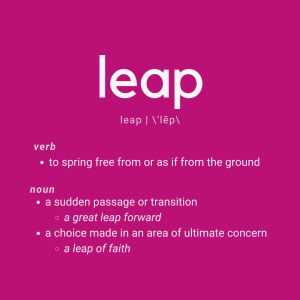I am an optimist. I would rather trust the potential I see in people and situations than be cautious of it.  But, because my penchant for rose-colored glasses has bitten me in the backside more than once, I choose to call on my naturally curious brain to apply some skepticism when I feel most like skipping off into the sunset. It’s not easy, but it helps me make good decisions and have better conversations.
But, because my penchant for rose-colored glasses has bitten me in the backside more than once, I choose to call on my naturally curious brain to apply some skepticism when I feel most like skipping off into the sunset. It’s not easy, but it helps me make good decisions and have better conversations.
This learned skepticism[1] has popped-up in two recent situations. Oddly, both of them were about positivity.
The first was during a daylong class on basic supervisory skills I taught last week. The group was talking about how to correct employees who are not meeting expectations. We came up with an example, and I gave my recommendation on dealing with the conflict.
One of the students said she really liked how I framed the correction and communicated the problem. She liked that I was so positive in my response. I pushed back on her comment and asked her to define what she meant by “positive.” She said that I was clear, direct and firm in both what I wanted the employee to do and in my description of how he had failed: I had conveyed confidence in his ability improve his performance, didn’t let him off the hook and didn’t dwell on the negatives in the situation. I appreciate that. I am good at what one co-worker once described as “being able to kick people in the ass while still letting them know you’re on their side.” Though her definition was helpful, something about being labeled as “positive” struck me the wrong way. This reaction was curious for a an optimist…
The second situation of learned skepticism happened when I came across Jon Stewart’s interview with Barbara Ehrenreich about her book Bright-sided: How the Relentless Promotion of Positive Thinking Has Undermined America (the book is now in my queue on Audible.com). Ehrenreich is critical of positivity for positivity’s sake and the seeming rabid need for Americans to claim their “power” in bringing a positive attitude into every experience in their lives, even if the experience is a cancer diagnosis, mortgage foreclosure or job loss. She is skeptical of the cure-all that the industry of “Positive Thinking” is peddling (motivational speakers, book sellers, teambuilding seminars and the like). Hers is a plea for realism: sometimes things are rotten – deal with it.
So, why did both of these situations give me pause to think about my relationship to positivity in the workplace? The problem lies in the assumed meaning of the word “positive.” The current view on being “positive” is superstitious: don’t think negative thoughts or you will fail in business or cause yourself some harm; we must be positive at all costs or the sky will fall!
In that sense, “positivity” is another word for “shortsighted ignorance” and “an intentional lack of critical thought.”
“Positive” is often used in the workplace in a way that made me need to ask my student to define her term. In order to be “positive” at work, one is frequently forced into an unholy alliance with an absence of criticism. The two need not be mutually exclusive, but human minds like things to be black and white, so it’s much more convenient if you can choose to be one or the other. Positive or negative – you pick. It is this type of simplistic thinking that gets both optimists and skeptics into trouble.
So, since I’m advocating for the complexity of cautious optimism and hopeful skepticism, why did “positivity” set me, a self-proclaimed optimist, on edge this past week? I discovered it has to do with language choice and the sin of omission in the cult of “Positive Thinking.”

Hope and positivity are often used interchangeably, but they are not the same. Hope, in my mind, includes the realization of what many people who proclaim the “Power of Positive Thinking” fail to mention: creating your own best outcomes requires a lot of hard work. Success at anything does not come from imagination and positive visualization alone, though those things are important and wonderful. What people who are committed to the Secret of the Think System conveniently omit is that it is the hard, frustrating, burdensome, aggravating, flummoxing business of working with yourself and others that gets a job done. A positive lens or decided optimism about how you experience that work can make the experience more pleasant, but it doesn’t accomplish anything on its own.
The clarification I was looking for in asking that student to define what she meant by “positive” was that I wanted to see if she perceived “positive” to be easy or non-confrontational or effortless. The reaction that I had to the superstitious nature of “Positive Thinking” that Ehrenreich addresses was initially supportive: we all need to snap out of the fog of misplaced positivity we have about how to think our way toward everything being perfect. But that’s not the complete story for me.
I like being a hopeful person, but I am determined never to rely on positivity in the superstitious sense. Optimism in the workplace requires a great deal of work if it is not to be misinterpreted as a disingenuous ray of sunshine being forced someplace that it doesn’t belong.
My view is that optimism and hope help to make your experience of the world more pleasant. AND if you want to live a great life or confront problems with a high level of efficiency and effectiveness, you need to know that sometimes things are awful, grief-strewn and require a great deal of hard work to get through them. It’s really okay that life is both positive and negative. Both can be true simultaneously. We cannot fix the things that need our attention and accomplish the things we want to with only a smile on our faces and a song in our hearts any more that we can do those things if we always have a suspicion in our eyes and a list of faults running through out minds. We need both of those perspectives and can have them in any ratio we choose.
I lean toward the first option, optimism, and try to remember to include the critical thinking of the second. I expect that with continued effort on my part, that approach will keep working just fine.
[1] For those of you with a converse problem, see Martin Seligman’s Learned Optimism. It’s a wonderful book and very informative.




